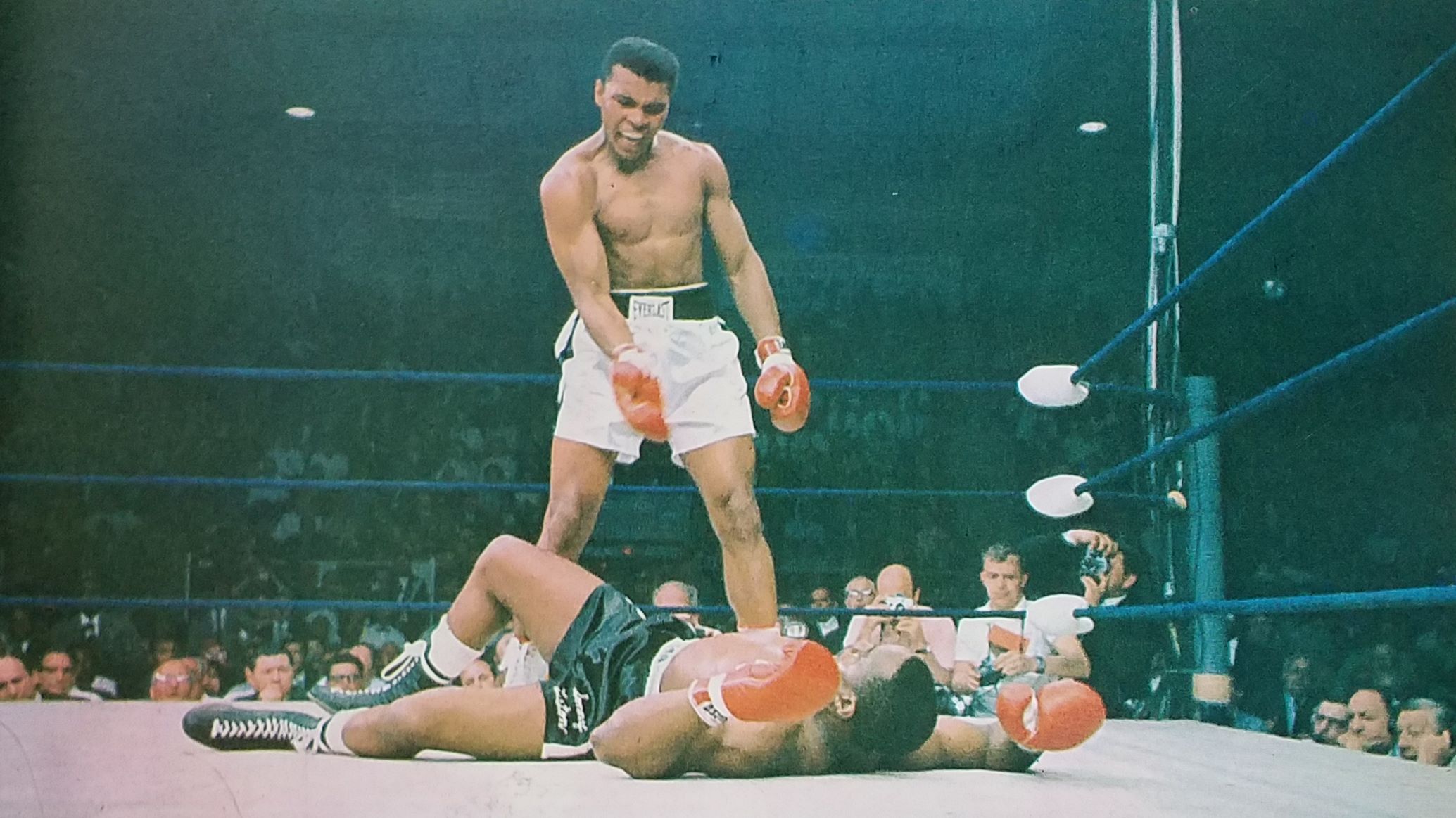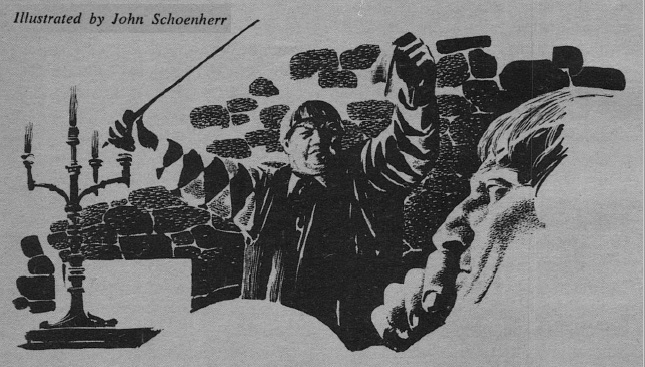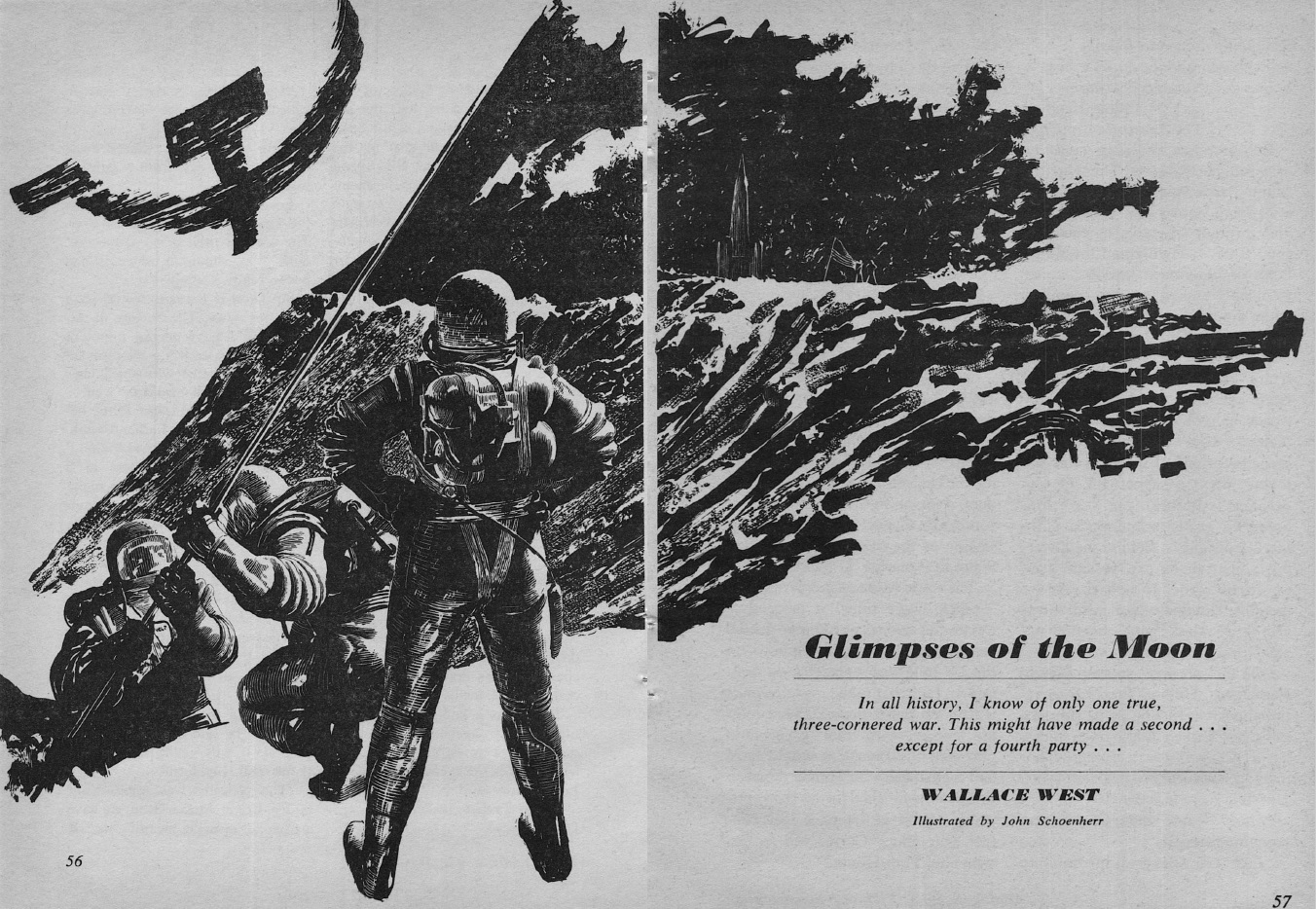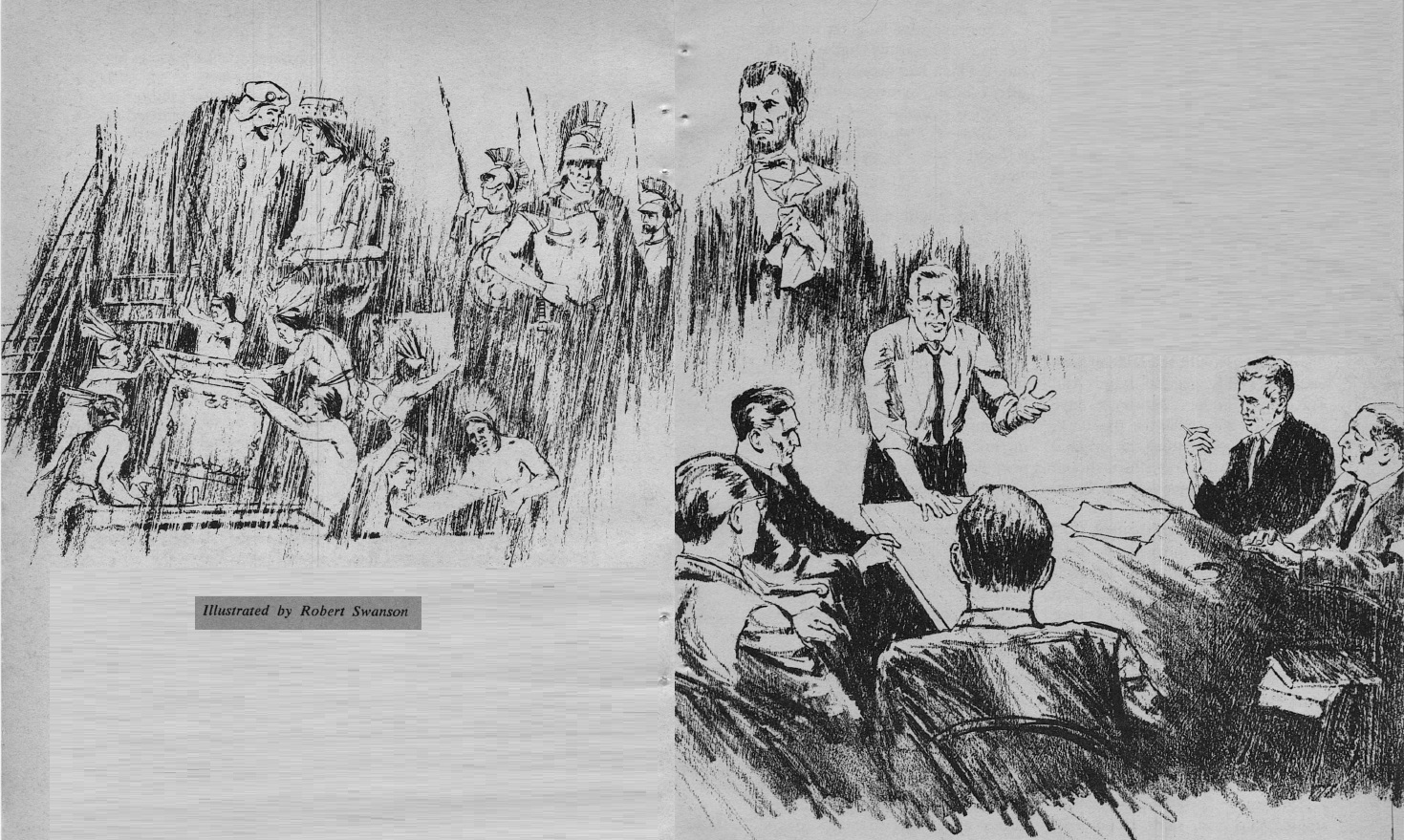
by Gideon Marcus
How the Mighty have Fallen
Since 1953, Sonny Liston has been a big name in boxing. Liston's spectacular career, marred by a prison hitch and rumored connections with organized crime, reached its pinnacle when he defeated Floyd Patterson in 1962 to become the world heavyweight champ.
He kept the title for two years, losing it in an upset to newcomer Cassius Clay. In last week's rematch, Clay, now named Muhammad Ali, beat Liston even more handily. Ali looks like he'll be keeping his title for a long time.

John W. Campbell Jr.'s Astounding was the heavyweight champion of science fiction magazines in the late 1930s, standing head and shoulders above its pulp competition. It retained this title all through the Golden Age of SF, which lasted through the 1940s.
For the last fifteen years, Astounding (now called Analog) has maintained the highest circulation numbers, by far, of the science fiction digests. It survived the mass extinctions of the late 1950s. Campbell is still at the tiller.
But there are signs that the old champion could become easy pickings for a scrappy newcomer. A recent flirtation with the "slick" format and dimensions was a dismal failure. The contents of the once-proud magazine have been staid for a long time. Then, of course, there's Campbell's personal weirdness, his obsession with fringe sciences, his odious opinions on race relations.
That's not to say Analog is an unworthy magazine, but it's got its problems. Exhibit A of Analog's vulnerability: the latest issue.
Handicapping the Reigning Champion

Did Campbell forget his is a science fiction magazine?
If I were a gambling house, I'd want to give my champion a thorough vetting, analyzing all of its strengths and weaknesses, and coming up with odds of victory accordingly. Let's imagine the June 1965 issue as a kind of exhibition bout and see how it does.
The Muddle of the Woad, by Randall Garrett

by John Schoenherr
The bell rings, and our champion is looking good. Randall Garrett is back with his third Lord Darcy story, a magical mystery series set in an alternate 20th Century in which England and France are united, Poland is the big adversary, and sorcery exists alongside technology. The Lord Detective, along with his tubby Irish spell-casting sidekick, Sean, solve the murders of the Empire's most prestigious citizens.
In the deliciously pun-titled case, Lord Camberton of Kent is found dead in a coffin intended for someone else, his body dyed blue with woad. Suspicion immediately falls on the Albion Society, a group of druids who reject Christianity. But is this a red herring? As with any good mystery, the cast of suspects is limited, and the ending involves the classic summoning of all to a room for a final deduction of the culprit.
Good stuff, as always. A fine story and a rich universe. Four stars.
Glimpses of the Moon, by Wallace West

by John Schoenherr
Oh, but now the champion is faltering. Wallace West, who wrote the rather delightful River of Time offers up a clunker of a tale. It is the late 1960s, and a three-way race to the Moon between American, the Soviet Union, and Great Britain has ended in something of a tie. While the representative of the U.S.A. clearly landed first, the Soviets claim that the Moon is the property of whichever country whose skies it happens to be in at any given time. Thus, ownership cycles with every day. In the end, it turns out that a fourth power has a much earlier claim on the body.
It's all very silly, but not in a particularly fun way. Two stars.
Hydrogen Fusion Reactor, by Edward C. Walterscheid

Last month, there was an article on magnetohydrodynamics — the use of magnetic bottles to contain thermonuclear reactions. This month, the science fact article is exclusively on nuclear fusion. Indeed, so proud is Campbell of this piece that he gave it the cover.
I was eager to learn about the state of development of this promising power source. Sadly, Walterscheid has not yet learned how to subdivide his points. Or write interesting prose. The result is an impenetrable wall.
Hmmm. Perhaps the article could be repurposed to line the walls of tomorrow's fusion reactor…
Two stars. Folks, the champion is staggering!
The GM Effect, by Frank Herbert

by Robert Swanson
Oh boy. Dune author Frank Herbert is back, and with another talking head story. Unlike his last one, which involved a congressional hearing on a widely distributed superweapon, The GM Effect is about a drug that allows takes to experience former lives. When it is discovered that this reveals all sorts of unsavory and forgotten tidbits of history (including that a Southern senator is one-quarter black), the drug's developers decide to cancel production. Then the military comes in, shoots the drug creators, and appropriates their creation.
Not only is the story rather pointless, it's distasteful. Herbert seems to be gleeful that Lincoln was personally no great lover of black Americans, and when the murdering general describes the erstwhile scientists as "N*gg*r lovers," I get less the sense that the utterer is supposed to be the bad guy and more that the author was delighted to be able to squeeze the word into a story.
One star…and our champion is down, folks! He's down!
Duel to the Death, by Christopher Anvil

by John Schoenherr
Nearly 30 years ago, Analog's editor wrote Who Goes There. One of the genre's seminal stories, it details the infiltration of an Antarctic base by a body-snatching alien, one that spreads via touch. The result is that one cannot tell friend from foe anymore. It's a chilling premise that has since been used to great effect, for instance by Robert Heinlein in The Puppet Masters..
Duel is a fairly straight entry in the genre. A spacer on a new planet has his suit punctured by some sort of dart, and he quickly succumbs to alien control. The purloined body becomes Ground Zero of an alien invasion that quickly takes over a nearby space fleet. Thus ensues a race against time: can the Terran Navy defeat this scourge before it absorbs the whole of humanity?
Most of this story is quite good, with some very interesting story-telling, often from the point of view of inanimate objects: the space suit of the first victim, the ship's sensors of the investigating fleet, the communications devices employed by the humans.
But, to distinguish Duel from its predecessors, the author ends the piece with a twist that doesn't quite work. I understand it, I think, but I don't quite buy it.
Three stars — good enough to bring our champion back to his feet, but flawed enough that he leaves the ring dazed.
Summing Up

Running our champion's performance through the Star-O-Vac, we come up with a rating of just 2.5. That's pretty bad. In a head-to-head against the other magazines of this month (and there was a bumper crop), how would Analog have fared?
Not well, it turns out. Partly, it's because the competition was quite strong: Fantasy and Science Fiction ended up on top with an impressive 3.5 rating. Worlds of Tomorrow garnered 3.2 stars and Galaxy got 3.1. Both Amazing and New Worlds got three stars, while Fantastic and Science Fantasy finished at a sub-par 2.8.
Only If ranked lower than Analog, meriting just 2.2 stars (sorry David!)
So, a disappointing performance by Campbell's mag augurs poorly for it. Will there be a Muhammad Ali of science fiction publications?
(P.S. Women wrote six of the 55 fiction pieces this month; none appeared in Analog — connection?)



But don't you think Analog in winning on interior art? And often for cover art.
John Schoenherr is a treasure, no doubt.
There you go. _Analog_, the SF magazine for those who can't read.
Campbell is so proud of that cover that he was touting the thing a few months back. It was originally supposed to run either last month or the month before. The picture is on the cover, because that's the only place they can do four-color printing, and for some reason he felt it was important for us to see to see the thing in living color. Ah, well, we already knew he was soft in the head.
Another marvelous Lord Darcy story. Garrett has finally found a space in the genre that he's genuinely good at. He showed a bit of a hand for mystery a few years ago with his Mcguire stories, but these have been much better. But wait. What's this? You liked the punning title? Who are you and what have you done with the Traveler?
The only thing I can really say about "Glimpses of the Moon" is that it really points up the flaws with the concept of "The Man Who Sold the Moon". Unfortunately for West, he's not one tenth the writer Heinlein is at his best, even though he's been at the game for over a decade longer.
The science article was dull as ditch water and I learned absolutely nothing from it. At least it was about real science.
The Herbert was pretty bad. This obviously grew out of thinking about the use of genetic memory in the Dune stories. Those Lincoln quotes weren't at all shocking. They come from his own writing and can be found in any in-depth biography not written by Carl Sandburg. It's a pity the story is so bad. You could probably get something interesting out of people exploring genetic memories while a shadowy cabal that wants to rule the world hunts them down. Maybe a whole series set in lots of interesting time periods.
"Duel to the Death" is quintessential Anvil. Really interesting stuff that almost always falls apart at some point. You seem to have grasped more of the ending than I did. It certainly didn't work at all and made even less sense.
My nephew, also named David, loved the punny title. I can appreciate puns! What's more shocking is that I can appreciate Randy Garrett!
As for the end of Duel, I had the impression that the Lieutenant General had either been taken over and used his new telepathic powers to jump to the main-Earth, or there are lots of Lieutenant Generals, and he's the main agent template for the collective.
But yes, it doesn't really work. Interestingly, that night, I dreamt that it wasn't Chris Anvil who'd written it but Cora Buhlert, and I gently chided her for writing a story with a dissatisfying ending…
Quite a mixed bag this issue.
Garrett seems to have really found his niche with these fantasy whodunits. I get the feeling that he really has fun writing them.
"Glimpses of the Moon" was nonsensical from beginning to predictable end. Worst story in the magazine.
"The GM Effect" wasn't good at all, but somehow I didn't dislike it as much as the West.
"Duel to the Death" started off very interesting. I'll admit that the ending left me baffled. What was all this stuff about the "radiation shields" (?) changing? Was this some kind of ESP-induced mental block that kept the invaders from finding the "baseline" humans (or whatever you want to call them)? Was the very end scene really taking place, or was it illusory? Color me confused.